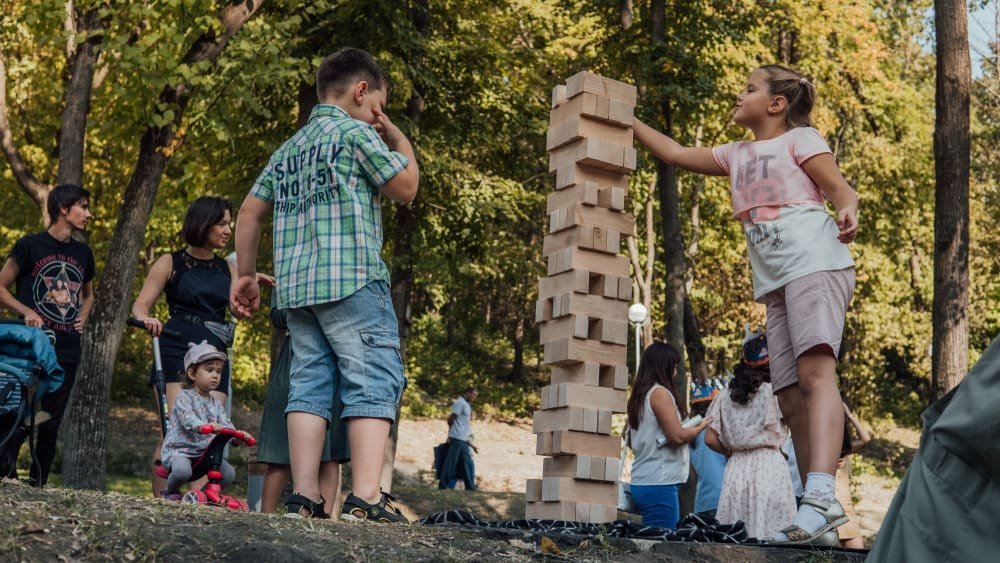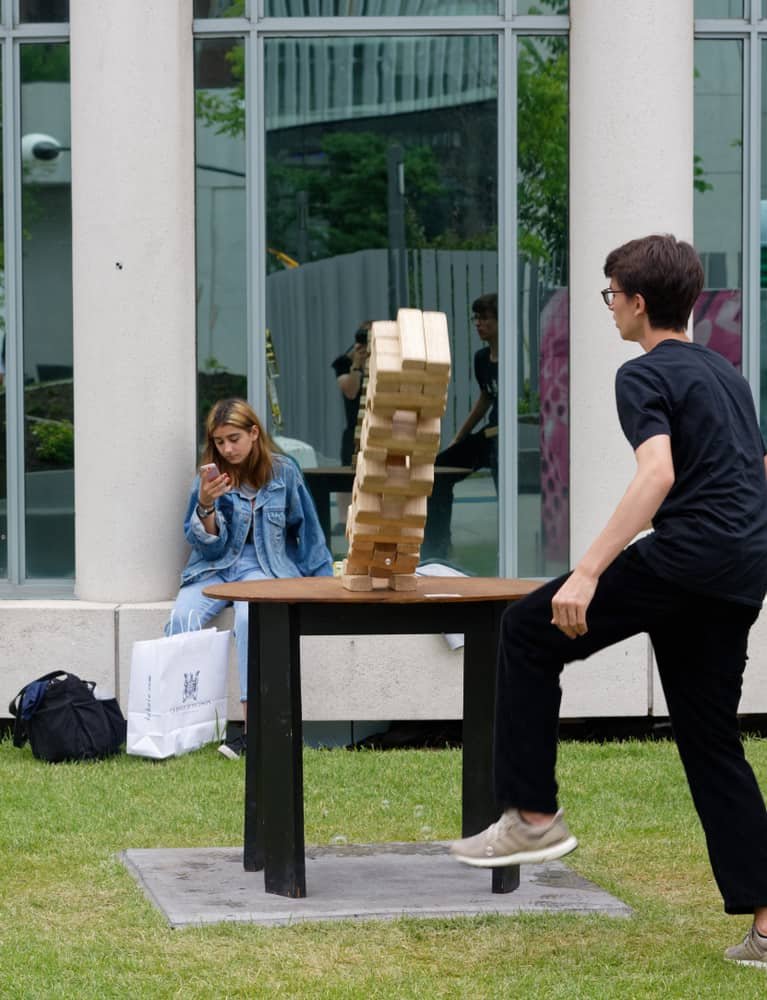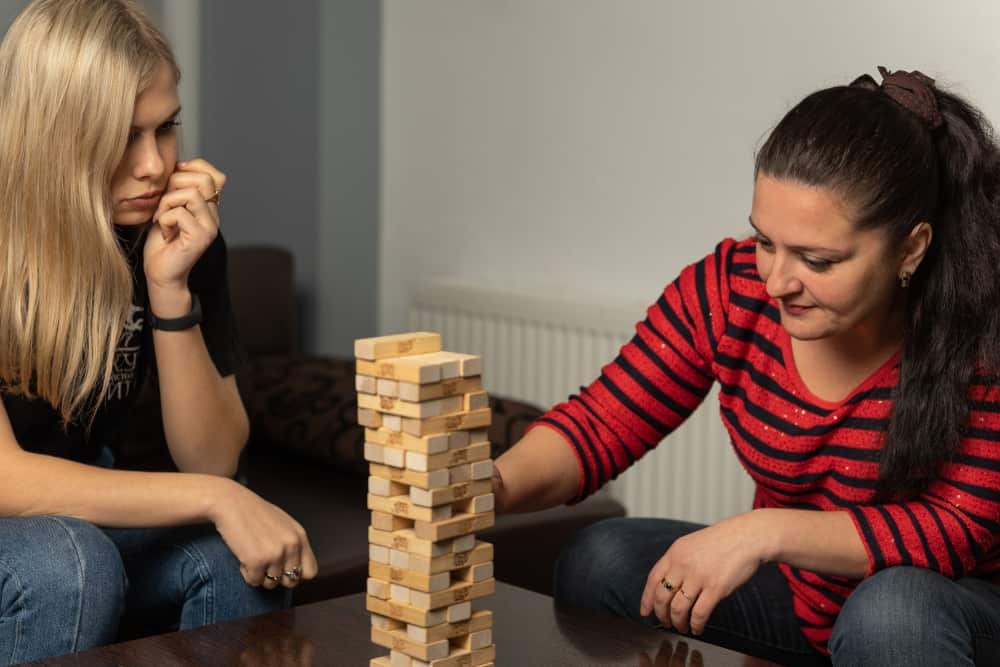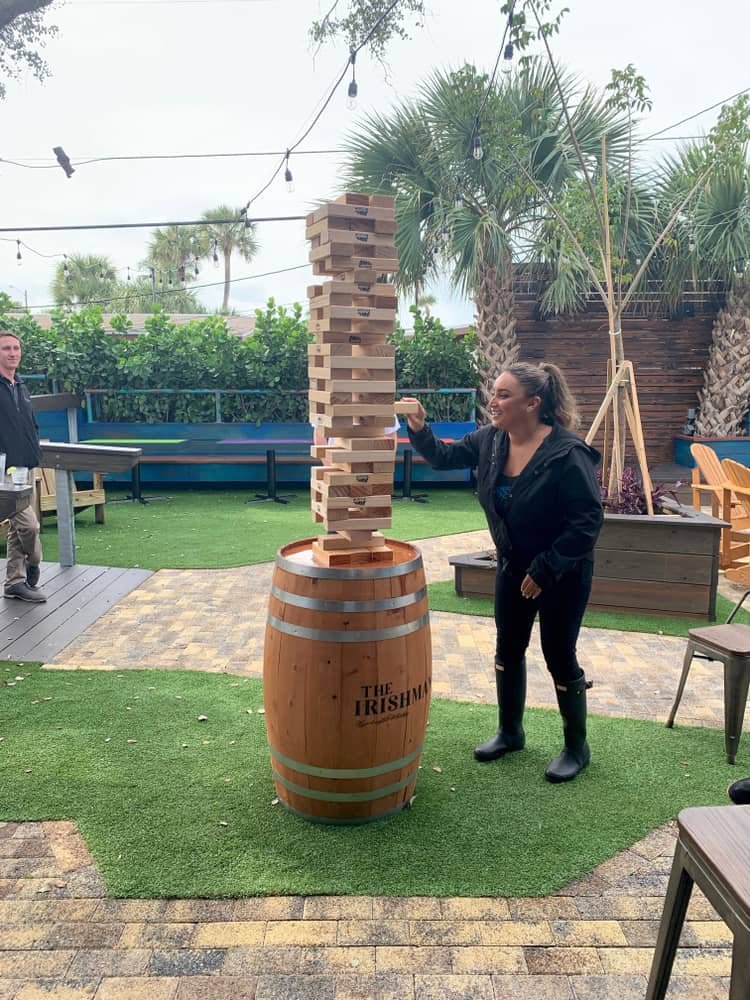Last Updated on January 7, 2024 by Gamesver Team and JC Franco

I’m sure you’re all familiar with the game of Jenga by now! It has been around since 1982 when it was officially launched in London at Harrod’s department store. It made its way to North America in 1986 and has been a popular game (for people of all ages and cultures) ever since! But, have you ever stopped to think that perhaps Jenga is more than just a game, could it be considered a sport as well?
Is Jenga a Sport? Yes, Jenga is a sport. Oxford dictionary defines sport as ‘an activity or pastime involving physical skill in which an individual (or team) competes against another for entertainment.’ Based on this definition, Jenga should be considered a sport.
For the purpose of this article, we’ll discover together the ways in which Jenga could be considered a sport. We’ll break down the definition of sport and see how each section relates to the game of Jenga. So, if you’re ready to learn more, then let’s get started!
How is Jenga a Sport?
Based on the dictionary definition of sport, Jenga could definitely be classified as one. Let’s take a closer look, shall we, by breaking down and discussing each key point to see how it correlates with the game of Jenga. That being said, let’s begin! A sport is…
‘An Activity or Pastime’

Jenga is definitely an activity or pastime. One of the main reasons why the game is played is to ‘pass the time.’ All that is required is a flat surface and wooden blocks. Jenga is an activity that can be played anytime, anywhere, by anyone. Therefore, Jenga absolutely fits this criterion of sport.
‘Involving Physical Skill’
Jenga is defined as ‘a game of physical skill.’ A sport is essentially a game of physical skill as well. The physical skills developed and improved by playing Jenga include:
- Manual dexterity. This is the ability to use your hands in a precise manner. Jenga is excellent for enhancing this physical skill. It requires players to carefully and precisely remove blocks using small, delicate finger manipulations along with smooth hand and wrist movements. Sports requiring a high level of manual dexterity as well include fencing, martial arts, and boxing.
- Hand-eye-coordination. This is the way in which your hands and eye-sight work together to physically grab objects. The act of reaching for a block, picking it up and then placing it on top of a tower is an excellent way to develop and improve this physical skill. Many sports also require a high level of hand-eye coordination, including baseball, basketball, football, tennis, and hockey.
- Fine motor proficiency. This is how we successfully use small muscles in the body to manipulate objects and function physically. By removing (and replacing) small blocks in (and on) a tower, Jenga helps to improve this essential skill by utilizing carefully controlled finger, hand, arm, and shoulder movements. Sports that also require fine motor proficiency include soccer, swimming, and track-and-field.

‘In Which an Individual (or Team) Competes Against Another’
Jenga is a game and therefore requires individuals to compete against one another to win! Like a sport, it can be played both individually or (with others) as a team. The object is to build the tallest tower. The player or team that does so (while maintaining the overall structure and stability of the tower) is the winner. The loser is the player or team that causes the tower to fall.
And, in the game of Jenga, just like any sport (apart from the rare occasion that a tie occurs), there is always a winner and a loser!
‘For Entertainment’
The ultimate goal for the game of Jenga is to have fun! It provides entertainment to those playing (and watching) it. In this way, it is very much like a sport. After all, there is no better reason to play any sport or game than for the sheer joy of it.
Other ways Jenga could be considered a sport
Apart from the dictionary definition, there are other ways in which Jenga could be viewed as a sport. Even the definition of ‘game‘ itself, which states that it is ‘a form of play or sport, especially a competitive one played according to rules and decided by skill, strength or luck,‘ supports the theory. Other ways Jenga is (like) a sport include the following:
Strategy is Key

- ‘Psyching out’ the opponent. This is a type of psychological warfare commonly used by athletes in the field and on the court. It is a way of mentally intimidating the competition and throwing your opponents off their game. This can be done when playing Jenga as well by commenting on the stability of the tower while the other player is trying to move his or her next block, for example.
- Simplifying the game. In many team sports such as football, coaches encourage their players to focus on just one play at a time, to keep them from getting anxious and overwhelmed. Concentrating on moving only one block at a time is a similar strategy used in Jenga to maintain focus and stay calm
.
- Planning your next move. Staying one step ahead of the competition is often the key to success in sports. In Jenga, setting yourself up for your next turn while making your opponent’s upcoming move more challenging is how you win the game
!
- Playing to your strengths. In sports, a player must be aware of his or her strengths (and weaknesses). It is the combined effort of each individual that leads a team to victory. In Jenga, if you happen to play the game in teams, each player needs to encourage the others to victory, making suggestions on which blocks to remove and when.
- Visualizing success. As with any sport, seeing the win at the end is crucial. A positive attitude will often lead to a positive outcome. This strategy also works with Jenga. Visualizing the tower getting higher and higher with each block movement (and seeing yourself winning it all in the end) is the key to triumph!
Played According to a Set of Rules
The game of Jenga, as with any sport, is played according to a set of pre-determined rules and regulations that are clearly outlined. You must follow these rules in order to successfully win the game. For example, one rule is that you can only play with one hand at a time. Many sports have playbooks outlining their specific rules and regulations, and so does the game of Jenga!
Winning is the result of a High Level of Skill and/or Strength (and sometimes Luck)
In most sports, the best and strongest athletes (or teams) usually win, but not always. Sometimes, luck plays a role in the final victory as well. This is also true with Jenga. The more you practice and play, the better you become and the higher your chance of winning every time. However, just like any sport, luck and chance also factor in so be prepared (like most athletes) to lose every once in a while.

In closing
According to the dictionary, a game is ‘a form of play or sport, especially a competitive one played according to rules and decided by skill, strength or luck.’ The word ‘sport’ is found right in the definition, and since Jenga is a game, it must, therefore, be a sport as well.
In this article, we have outlined the ways in which Jenga fits into the dictionary definition of sport. We have taken that definition, broken it down, and explained piece-by-piece why the game of Jenga is like a sport.
Now, it’s time to break out the wooden blocks, take them to your favorite sports club or rec center and challenge someone to a friendly Jenga game (competition) today! Good luck and ‘may the best player (or team) win’!

